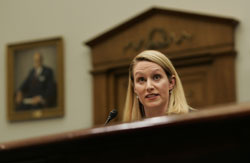| Home | Blog | Ask This | Showcase | Commentary | Comments | About Us | Contributors | Contact Us |

Midnight rulemaking, last-minute hires and executive fiatsASK THIS | June 162, 2008How are Bush officials using their executive branch powers to entrench their policies in the bureaucracy and make it harder for their successors to change course? Part two of a five-part series on questions for the twilight of the Bush era. By Dan Froomkin I wrote in part one of this series that it’s reasonable to suppose that top administration officials are spending a lot of their energy trying to make it as difficult as possible for their successors to roll back their policies. And as it happens, there are many ways to entrench people and policies within the executive branch. Indeed, it’s traditional for presidents to work until the last minute to hire and promote amenable civil servants, establish rules, and issue orders intended to outlive them. There are some persuasive reasons to suspect Bush will set a new record. Senior-level career civil servants have a lot of incentives to talk to reporters about many of these topics, particularly as they see the light at the end of the Bush tunnel. Q. Are Bush loyalists burrowing into the civil service? Will political appointees engage in a last-minute flurry of hiring and promoting Bush loyalists into key civil service jobs? Will political appointees try to make the jump into the civil service? Agency burrowing can happen in two ways. Political appointees can hire and promote like-minded people into key civil-service positions; or political appointees (who by definition are hired and fired by the administration in power) can actually attempt to convert their jobs to civil-service positions (from which they can only be fired for cause.) The latter tactic happens to be illegal, but not entirely uncommon. That the Bush administration has politicized civil-service hiring like never before became abundantly clear during last May’s testimony to the House Judiciary Committee by Monica Goodling, a former top Justice Department aide. As David Johnston and Eric Lipton reported in the New York Times at the time, Goodling acknowledged an open secret at Justice: That applicants were asked political questions in their interviews, and that those with Republican credentials were favored for a whole host of civil-service positions, contrary to federal law. Q. Are political appointees continuing or even accelerating their attempts to drive key civil servants out of their jobs? A recent example of such behavior comes from Michael Hawthorne of the Chicago Tribune, who reported in early May that Mary Gade, head of the U.S. Environmental Protection Agency's Midwest office, was forced out of her job after turning up the pressure on Dow Chemical to clean up dioxin contamination in Michigan. A particularly unique facet of Bush’s approach to the executive branch has been a pattern of driving out competent, senior-level civil servants – often by removing their decision-making power – and replacing them with unqualified Republican loyalists. As Princeton University Professor David E. Lewis wrote on NiemanWatchdog.org, the effect of that can be profound:
FEMA’s incompetent response to Hurricane Katrina will of course be one of the lasting legacies of the Bush term. The White House’s disregard for scientific findings that don’t support their political beliefs is another hallmark. But there is also reason to believe that by removing people who know how to make government work, Bush political appointees have presided over a stealthy but steady erosion of government competence across the board. The question now is how bad have things gotten, and will they keep pushing good people out until the last minute. Q. Are Bush political appointees working on last-minute reorganizations within the federal government? Another way Bush political appointees can tie the hands of their successors is to reorganize departments, divisions or sections in such a way that favors functions they support, at the expense of functions the incoming administration supports. Reducing the size of particular staffs, changing an office’s organizational chart, altering its reporting structure, or changing its physical location can all have profound and hard to reverse effects on an agency’s mission. Q. Are major contracts being let out that have long-term ramifications? And are any of those related to outsourcing? Another way to fundamentally change the government a new president inherits is to replace civil servants with contractors. Q. Are advisory boards being stacked with Bush loyalists? The Clean Air Scientific Advisory Board, just as one example, plays an important role in establishing such things as ozone standards. Will Bush appointees purge such boards of dissenters from the party line? Q. Will a White House memo banning last-minute rulemaking be heeded? Last-minute rulemaking is another longtime White House tradition, and one Bush was widely expected to continue, or even accelerate. University of Michigan Law Professor Nina A. Mendelson, in a seminal 2003 New York Law Review article entitled “Agency Burrowing: Entrenching Policies and Personnel Before a New President Arrives,” examines a variety of tactics including midnight rulemaking.” In an interview, Mendelson explains: “One thing that nearly every departing president has done is encourage administrative agencies to issue rules.” Agency rules, if properly issued, have the effect of law. For instance, private parties can challenge an agency in court for failure to comply. And such rules can be far-reaching, for instance establishing the rights of consumers or legal conditions for workplaces. The advantage of issuing rules is that “rules, once they are issued, are comparatively difficult to change,” Mendelson says. To issue a rule, an agency must publish a proposed rule in the Federal Register, solicit comments, then issue a final rule, also in the Federal Register.“ That’s a process that takes several months at best. “An incoming presidential administration that wants to change a rule has to go through the exact same process,” Mendelson says, and even then the Supreme Court has ruled that regulations cannot be reversed without an extra explanation for the agency’s change in position. “This is a big burden to impose on an upcoming presidential administration,” Mendelson says. The process by definition is a public one, however, with all those notices in the Federal Register. And the Bush administration is now on record saying that it will not be trying to push anything through at the last minute. In fact, as Matt Madia recently wrote for OMBWatch.com: “White House Chief of Staff Joshua Bolten sent a memo to the heads of federal agencies outlining the administration's policy on rules those agencies want to finalize by the end of the Bush administration. The memo states, ‘Except in extraordinary circumstances, regulations to be finalized in this Administration should be proposed no later than June 1, 2008, and final regulations should be issued no later than November 1, 2008.’” That said, Madia offers up a “sampling of rules the Bush administration may push to finalize in its waning days of power, in the event a new administration disagrees with its policy positions:
Robert Pear wrote in the New York Times in December:
Other critics, in a theory noted by Cindy Skrzycki in the Washington Post on June 3, think the administration’s November deadline is for real – and is actually a move to shut down the regulatory apparatus early. So the corrollary question would be: Q. How many key regulatory processes have been suddenly shut down? Here's something else to be mindful of: Permits for such things as authorization of timber sales, Mendelson says, are “reviewable and not completely secretive, but also quite difficult to revise.” Q. Will the administration issue many last-minute permits? And: Q. Will the administration suddenly settle major litigation on different terms than what a new administration might prefer? While rulemaking is reversible with difficulty, litigation settlements can have profound policy implications and are not reversible. Q. Is Bush intending to issue many last-minute executive orders? Presidents also routinely issue executive orders on their way out the door. It’s one of the easiest ways of making mischief for their successors. Executive orders typically change the way an agency does business. They can be reversed fairly easily – all the new president has to do is issue an alternate order. But Mendelson says that’s still “a pain for the new president.” If nothing else, it takes time to write an executive order. And if the new president’s staff is grappling with several dozen that need to be countermanded in several different areas, “it’s a drain on the president’s own agenda.” Sometimes it’s easier just to leave them in effect indefinitely. Bush will undoubtedly be under considerable pressure to sign executive orders that would benefit business interests and social-conservative groups. For instance, Stephanie Simon writes in the Wall Street Journal (subscription required) that conservative activists are renewing a drive for Bush to sign an order that would deny federal subsidies to clinics that provide abortions or counsel women about the option. Q. Are appointees in federal agencies trying to cover their tracks? Are documents being properly retained? As Steven Aftergood recently wrote on NiemanWatchdog.org:
But that, of course, depends on appointees not destroying key documents. Entrenchment, the Series: Part One: Do we really expect the Bushies to go quietly?
|
||||||||||||




